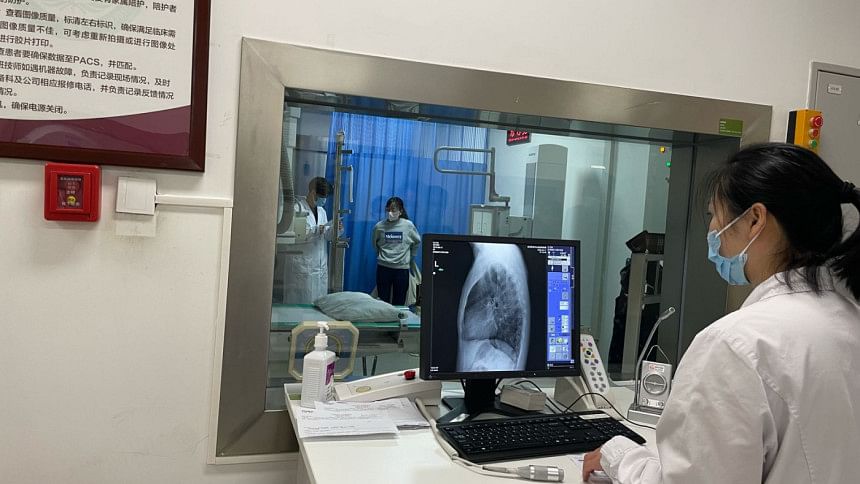What can we learn from China’s healthcare system?

As part of a new chapter in bilateral ties between China and Bangladesh, 14 patients from Bangladesh were sent to the Southeast Asian country for free medical treatment and check-ups at four designated hospitals on March 10, 2025.
This initiative is part of a broader collaboration between China and Bangladesh to enhance healthcare services. One of those hospitals was the Fuwai Yunnan Cardiovascular Hospital, where three Bangladeshi children with congenital heart diseases were admitted for surgery. The hospital offers specialised services in cardiovascular care, complex surgeries, cancer therapy, orthopaedics, and the treatment of kidney and liver diseases. The admission of these Bangladeshi children reflects its commitment to international medical cooperation.
As part of the 10-member journalist delegation, I was privileged to witness the hospital's mechanisms, treatment facilities, and more. I learned that these children would be at the hospital for a week at most—prompting the question, "How?"
But with state-of-the-art facilities, modern technologies, and even an AI-powered MRI machine, the answer is "How can it not be?"
Fuwai Yunnan Cardiovascular Hospital, located at Kunming's Wuhua District, is a leading medical facility specialising in cardiovascular diseases. Established in September 2017, the hospital spans 70,000 square metres and a budget of 3.3 billion RMB. It houses 700 beds, 12 operating theatres (including two hybrid ones), and 10 interventional catheterisation rooms.
As an affiliate of the Chinese Academy of Medical Sciences, Fuwai Hospital is also recognised as a national triple-A, first-class hospital specialising in cardiovascular diseases.It serves as the National Centre for Cardiovascular Diseases, the State Key Laboratory of Cardiovascular Disease, and the National Clinical Research Centre of Cardiovascular Diseases. Internationally renowned for treating complex cardiovascular conditions, it stands as one of the world's largest cardiovascular centres, contributing significantly to clinical healthcare, medical research, disease prevention, and education.
Fuwai Yunnan Cardiovascular Hospital continues to play a pivotal role in advancing cardiovascular healthcare, both domestically and internationally, through its state-of-the-art facilities and comprehensive medical services. The hospital offers a full spectrum of services, from preventive measures to complex surgical interventions, ensuring holistic patient care.
In June 2024, the hospital achieved a significant milestone by performing the first robotic-assisted transcatheter edge-to-edge repair with pure echocardiographic guidance, showcasing its commitment to adopting cutting-edge technologies. Meanwhile, as an active participant in cardiovascular research, the hospital is involved in numerous clinical trials, contributing to advancements in the field and offering patients access to novel therapies.
It also has electronic "vending machines" that provide medical reports, X-ray films, and more directly to patients after relevant information is provided. These machines are located on multiple floors, preventing patients from waiting hours just to receive a simple blood test report.
Since 2018, the hospital has been working with the Cambodia-China Friendship Preah Kossamak Hospital in Phnom Penh. Through the Cambodia-China Love Heart Journey programme, over 79,000 children in Cambodia have received check-ups, with 122 diagnosed with congenital heart disease. To date, 107 Cambodian children have been brought to China for free surgeries, with another 10 treated locally in Cambodia.
Speaking to a translator accompanying five paediatric patients from Cambodia on March 11, this correspondent learned about the hospital's process for treating foreign patients.
"After admission, they spend around a day or two conducting relevant tests on the patient to determine which areas need focus. After that, they consult specialists, most often from Beijing, and set a suitable date for the surgery, which takes around two to three hours. Once the surgery is over, the child is sent to the paediatric ICU for initial recovery, which usually takes only a couple of days. The child is then transferred back to the ward for observation, and once the doctors deem the patient fit enough for physical activity, they are discharged. The whole process does not take more than a week," said Sokhon, the translator for the Cambodian patients.
Fuwai Yunnan Cardiovascular Hospital's dedication to integrating state-of-the-art facilities with innovative procedures and international cooperation underscores its role as a leader in cardiovascular healthcare.
If this hospital's model is indeed adopted in Bangladesh, we can expect the much-needed giant leap forward in our country's healthcare system.

 For all latest news, follow The Daily Star's Google News channel.
For all latest news, follow The Daily Star's Google News channel. 



Comments